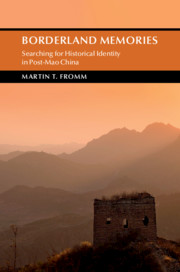Book contents
- Borderland Memories
- Cambridge Studies in the History of the People’s Republic of China
- Studies of the Weatherhead East Asian Institute, Columbia University
- Borderland Memories
- Copyright page
- Dedication
- Contents
- Acknowledgments
- Introduction
- 1 Reconfiguring Cultural Production in the Post-Mao Transition
- 2 Borderland Ambiguities in Narratives of Modernization and Liberation
- 3 Relocating the Nation outside the Nation
- 4 The “Historical Science” of Wenshi Ziliao
- 5 Affective Community and Historical Rehabilitation
- 6 Mobilizing a “Patriotic United Front”
- 7 Local, Regional, and National Dynamics of Wenshi Ziliao Production
- Conclusion
- References
- Index
- Studies of the Weatherhead East Asian Institute, Columbia University
5 - Affective Community and Historical Rehabilitation
“Widely Making Friends” to Resecure Political Loyalty
Published online by Cambridge University Press: 18 February 2019
- Borderland Memories
- Cambridge Studies in the History of the People’s Republic of China
- Studies of the Weatherhead East Asian Institute, Columbia University
- Borderland Memories
- Copyright page
- Dedication
- Contents
- Acknowledgments
- Introduction
- 1 Reconfiguring Cultural Production in the Post-Mao Transition
- 2 Borderland Ambiguities in Narratives of Modernization and Liberation
- 3 Relocating the Nation outside the Nation
- 4 The “Historical Science” of Wenshi Ziliao
- 5 Affective Community and Historical Rehabilitation
- 6 Mobilizing a “Patriotic United Front”
- 7 Local, Regional, and National Dynamics of Wenshi Ziliao Production
- Conclusion
- References
- Index
- Studies of the Weatherhead East Asian Institute, Columbia University
Summary
The Party exhibited a continued ambivalence toward local elites in the process of truth and reconciliation, combining a rhetoric of affective community with political study sessions and uncertainty about Party status. Wenshi ziliao were part of a broader set of PPCC strategies, including “democratic political supervision and consultation,” aimed at co-opting and mobilizing local elites. Wenshi ziliao organizers invoked this rhetoric to bring about political healing, naturalize ideological indoctrination, and reintegrate alienated scientists, intellectuals, and entrepreneurs. This mobilization strategy involved the use of historical materials as legal evidence for “political rectification” and rehabilitation that was employed to generate political loyalties locally, nationally, and overseas; the subjection of wenshi ziliao participants to restorative rites of confession and redemption; and the adoption of interviewing strategies to balance inclusive accommodation with exclusionary political control through sentimental bonds between interviewer interviewed. In the specific context of the northeast borderland, the early influence of Russian and Japanese colonialism sparked questions about who belonged within an acceptable national narrative and brought to the fore local identities that deviated from the Party-centered version of history.
Keywords
- Type
- Chapter
- Information
- Borderland MemoriesSearching for Historical Identity in Post-Mao China, pp. 154 - 199Publisher: Cambridge University PressPrint publication year: 2019

